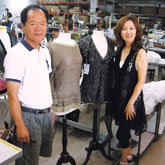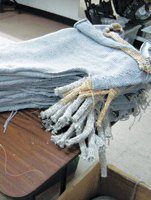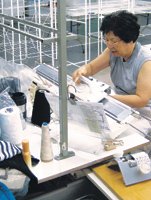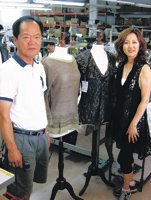Sweater Production Remains in Los Angeles for High-End Brands
Even though China has cornered the U.S. sweater market for years, a handful of die-hard companies in the Los Angeles area are still churning out knits targeted primarily for the high-end market.
One of those is Ball of Cotton, which launched its own sweater line in 1991 out of a small knit factory in downtown Los Angeles.
Today, it has a 13,000-square-foot facility in Commerce, Calif., with 14 automated knitting machines and at least 10 hand-loom machines that every month whip up 3,000 to 4,000 sweaters wholesaling for $145 to $225.
“I am really proud that I make things in the United States,” said Eddy Park, who founded the company after years of working at Picardo Knits, a Los Angeles company that closed in 1977, and French Rags, started by Brenda French.
Another longtime sweater producer that has survived the overseas-sourcing trend is Andari Fashion Inc. in El Monte, Calif. It was founded 20 years ago by David and Lillian Wang at a time when four or five other sweater factories thrived in El Monte. Now Andari is the only major one left. “We all knew each other,” said Ilona Wang, director of marketing and the Wangs’ daughter. “Then they all went out of business. There weren’t enough customers, or some people decided there was no future in doing domestic production.”
Today, Andari has more than 100 employees, who pump out about 30,000 private-label sweaters a month. The company expects production will grow to about 40,000 sweaters a month with the addition of 10 newly acquired automated knitting machines that will complement the 40 automated knitting machines on hand.
“We have been seeing customers coming back to the ‘Made in USA’ label,” Wang said. “This started a couple of years ago. So this year, our company evaluated our current customer base and decided to add new machines.”
While Ball of Cotton and Andari have been around for years, there are a few budding newcomers carving out their own niche.
In early 2007, Evita Chu launched PDR Knitting in south Los Angeles as a company specializing in very high-end, private-label sweaters whose retail prices often start at $600. The company has 16 hand-loom knitting machines and five automated machines that produce about 1,000 to 1,200 sweaters per month.
“We do everything from product development to production,” said Chu, who has 22 employees. “We really specialize in cashmere processing, and we tweak the washes.”
PDR has done development for 7 For All Mankind’s sweater line, which is produced overseas, and production for The Row, the high-end label developed by twins Mary-Kate and Ashley Olsen. The company has even made costumes for Hollywood, knitting a sweater worn by actress Renée Zellweger in “Leatherheads” and a sweater seen on Jamie Foxx in “The Soloist.”
Capitalizing on “Made in USA”
Keeping sweater production in the United States isn’t easy, but Ball of Cotton, which has 21 employees, capitalizes on quick turn and its unique design-to-production cycle.
Eddy Park and his wife, Elizabeth, have been producing and designing the label for 21 years, selling primarily to high-end specialty stores.
Eddy Park serves as the company’s president, and Elizabeth is the company’s vice president. But her title doesn’t describe everything she does. Elizabeth is responsible for a range of jobs, from shipping and bookkeeping to designing. For the brand’s special styles, she looks to runway shows and trends to get her inspiration for the sweaters, whose silhouettes range from cardigans to ruffle-edged tops. She also listens to customer feedback on colors and trends. “We feel joy in our achievements,” Elizabeth said. Almost all the sweaters are hand-loomed and made of an array of yarns that include bamboo, silk lace, cashmere, super-fine merino wool, linen and viscose stretch.
Many yarns are already in stock, as seen by the row upon row of yarns stacked in a room full of shelves standing to one side of the warehouse where the clacking noise of knitting machines is heard in the background. About 80 percent of Ball of Cotton’s production is done for its own label, but the company also does private-label production.
Eddy Park’s journey into the sweater business is the tale of a hard-working immigrant. When he was a teenager, his family migrated in 1964 from South Korea to Argentina, traveling on a freighter that stopped at 12 countries and took 2½ months to get to the family’s final destination.
The Parks lived in Argentina for seven years before moving to the United States in the early 1970s. Upon arriving in Los Angeles, one of Eddy’s first jobs was sweeping the floor and doing odd jobs at Picardo Knits.
That lasted six months until a restless Eddy moved to New York, seeking new horizons. He worked in the Big Apple for a few months as a dishwasher before returning to Los Angeles and joining the U.S. Army. Three years later, when he left the Army, he returned to work at Picardo Knits until 1977, when the owner died and the company closed. Tapping into his entrepreneurial spirit, Park bought five knitting machines from Picardo to make sweater samples that he developed. To his surprise, he got an $8,000 order. “The problem was that I got the orders, but I didn’t have credit to buy the yarns,” he remembered.
So he then started doing contract work for French Rags, a Los Angeles scarf, accessories and sweater line started by Brenda French. When she decided to do her own knitting, employing as many as 200 people in West Los Angeles, Park worked with her until the late 1980s, when he left to concentrate on his own line that he had wanted to start years earlier.
Park decided to concentrate on selling his burgeoning Ball of Cotton line to specialty stores instead of department stores. The line grew steadily until the terrorist attacks on Sept. 11, 2001. Since then, Park said, business has never been the same, and his employee payroll has dwindled from 50 people to 21.
The slowdown in sales several years ago prompted Park to buy more computerized knitting machines that are faster than hand-loom machines and offer the possibility to boost private-label production.
At full capacity, Ball of Cotton is able to produce 6,000 sweaters per month.
“In the future, I would like to do more contract work,” Eddy Park said. λ

























